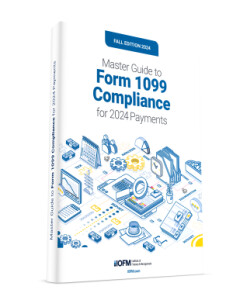
- Membership
- Certification
- Events
- Community
- About
- Help

Last revised: August 28, 2024
The 2024 Master Guide to Form 1099 Compliance gives you practical and authoritative assistance for Form 1099 compliance and avoidance of penalty assessments – including the broad expansion of the federal requirement to file your organization’s Forms 1099 electronically, and the requirement to use the new March 2024 Form W-9 to obtain your payee’s reportable name, tax ID number and status for tax reporting purposes.
The 2024 Master Guide covers the Form 1099 reporting issues and scenarios encountered all year long in Accounts Payable, highlighting the changes which impact your 2024 year-end reporting, and also guiding you through easy-to-understand explanations you’ll use throughout 2025 on the fundamental rules and common reportable payment situations in this area of tax compliance.
What’s new in the 2024 edition:
Sections of the Guide include updates to IRS forms; the IRS electronic filing requirements; security protocols and transmitter codes for IRS electronic filing; understanding the new Form W-9 and which payees may be exempt from being reported; Forms 1099-NEC, 1099-MISC and 1099-K explained with numerous examples of reportable payments; 24% backup income tax withholding requirements and due dates for federal tax withholding deposits; the special reporting requirements which result from legal settlements and amounts payable to attorneys; fringe benefits and expense reimbursements; worker classification (employee vs. independent contractor); due dates for Forms 1099 to the IRS and copies to payees; extensions of time for 1099 filing and furnishing payee copies; state Form 1099 filing information; IRS “B” notices and proposed penalty notices; and more.
Join today to access Join today to access BUY THIS GUIDE Access the Master Guide Access the Master Guide
What are you waiting for?
